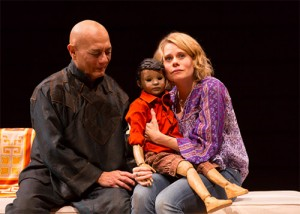Sarah Ruhl's new play The Oldest Boy may be filled with a sense of cosmic mystery, but there's one question that's not mysterious at all.
When the show begins, an American mother is visited by a pair of Buddhist monks who believe her three year-old son, Tenzin, is the reincarnation of their beloved teacher. And as it happens, they're absolutely right. That's why they want to take him to the Tibetan monastery where he lived and taught in his previous life.
For Ruhl, it was important to establish the boy's spiritual bona fides right away. "I didn't want to have it be a mystery play about, 'Is it true that this child is the reincarnation?'" she says. "That interested me less than asking, 'If you're a mother in this situation, where you come to be fairly certain that your child is a reincarnated lama, then do you have the wherewithal to send your child to a monastery?"
So it's precisely because the play confirms its supernatural elements that it's free to explore relatable, human emotions. If we're not debating Tenzin's past, then we can focus on how his parents feel about letting him go. As Ruhl, a mother of three, explains, "The play is about religion, but it's also about really looking at your child and seeing your child and having an unconditional love for who your child is."
And that's not the only way The Oldest Boy, which is now in its world premiere at Lincoln Center Theater's Mitzi E. Newhouse space, finds the familiar in something unreal. Tenzin, for instance, is played by a bunraku puppet, and we see three puppeteers move him around the stage. One of them, the actor Ernest Abuba, also speaks Tenzin's lines, creating a striking theatrical image of a grown man providing the voice of a reincarnated boy.
Because he's a puppet, Tenzin also has the ability to seem like a universal child. As we watch him clamber around the set or hug his parents or play with a toy, we can easily project our own experiences onto him. That level of connection makes it all the more powerful---all the more real---when Tenzin starts embracing his spiritual life.
Take a scene where he gets his hair cut as part of a Buddhist ritual. "There's something about the first haircut for any parent that's kind of hard, and you keep their hair, " says Ruhl. "But here you compound it with the fact that someone is shaving the child's entire head, and the meaning of it is that now your child is going to belong to this larger spiritual community and not as much to you."
That idea points to a deeper current in the script. Even though the show follows a single family, it ends with a gorgeous coup de theatre that suggests how all souls, all people, remain connected to each other. For Ruhl, that's a crucial hint of vastness. "Otherwise," she says, "the play becomes more sociological and about reincarnation as a Tibetan Buddhist concept, as opposed to rebirth as a more universal concept."
---
Mark Blankenship is the editor of TDF Stages
Photo by T. Charles Erickson
